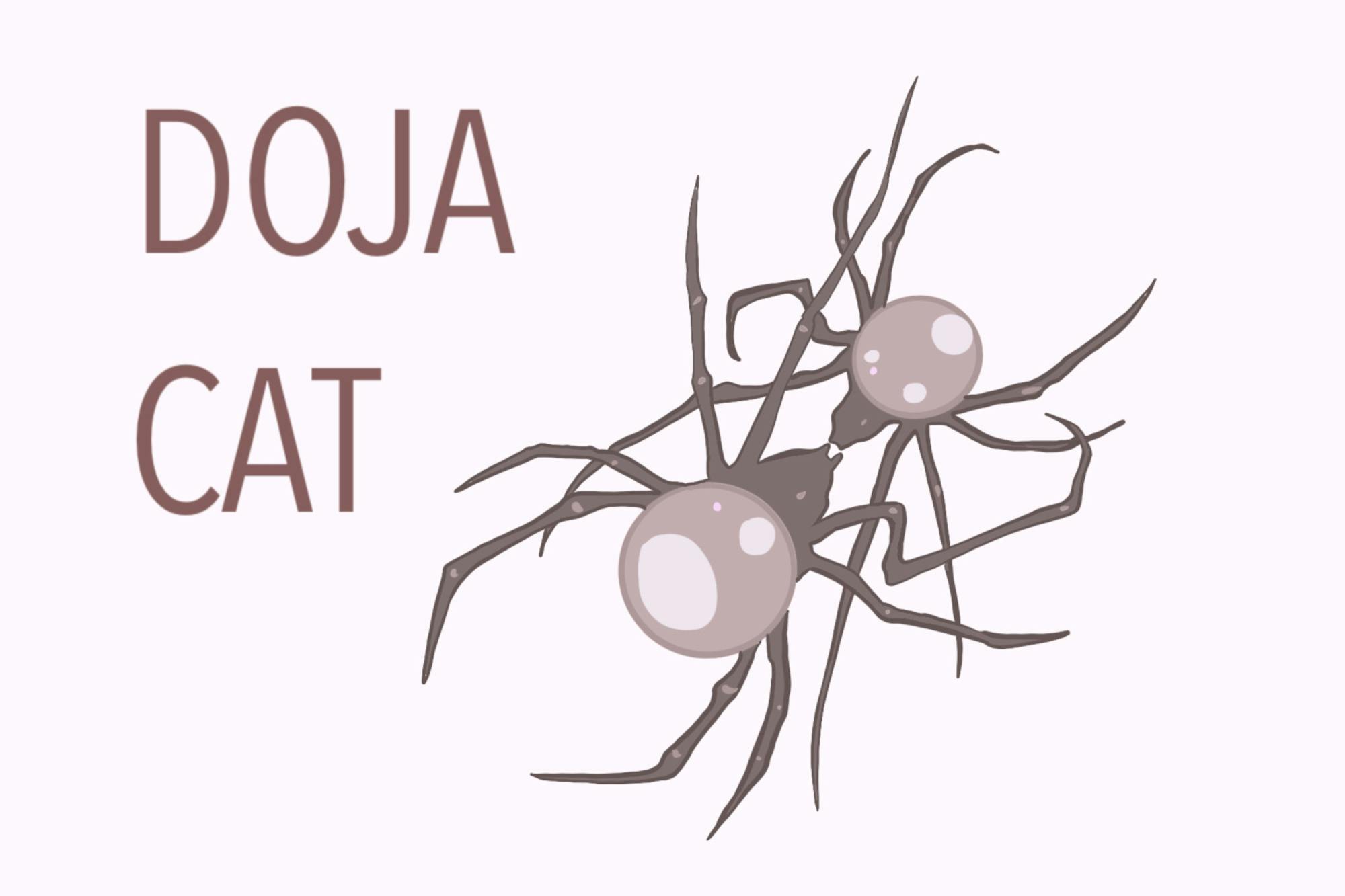Pop star Doja Cat has just released her fourth studio album “Scarlet,” a marked departure from her previous feminine aesthetic into a darker, punk-inspired style. Doja told Variety, “I know that I’ve done a lot of pink and soft things, a lot of pop and glittery sounds … but for this next era, I’m going in a more masculine direction.” With her new album, Doja is still Doja at heart — she once again showcases her depth and breadth as a vocal performer by effortlessly switching between singing and rapping. However, “Scarlet” thematically over-promises and under delivers, suffering from a lack of features and its 51 minute runtime that overstays its welcome.
Doja has always had a provocative public persona, starting from the very beginning of her career with her breakout viral hit “MOOO!” The leadup to this album was no different, as Doja vocalized her disillusion with pop music and the public perception of her after “Planet Her” in 2021. Over the summer, in response to public criticism of her emotionally abusive boyfriend, she wrote on social media, “I NEVER WILL GIVE A F*** WHAT YOU THINK ABOUT ME… GOODBYE AND GOOD RIDDANCE MISERABLE H**S.” She promptly lost hundreds of thousands of followers overnight. But of course, she only seems more emboldened by this recent controversy.
Leading up to the album’s release on Sept. 22, Doja’s past album and single covers were colored red across all streaming services, symbolizing her desire to paint the world red. The album’s lead singles “Paint the Town Red” and “Demons,” which were released in August and early September, respectively, cemented her new demonic, unhinged persona. Doja seems to double down on her social media quarrel with her fans, as she raps “b***h, I said what I said” on “Paint the Town Red.” But for all of the eyebrow-shaving and red body paint as a supposed rebrand, Doja still exudes the same girlboss energy that she became famous for on “Planet Her.” On “Scarlet,” she is unapologetically herself, retaining the hypersexuality that made her known — some of her more bombastic bars this time around include “I bring the drip with wet vagina” on the aptly named “Wet Vagina” and “said suck my d**k, c**t, tits, I’m yellin’ 666” on “F**k The Girls (FTG).” Humility is not common vocabulary for a rapper, and she plays this part better than ever.
Doja is not the first artist to reinvent herself with a darker persona, nor is she the only pop star to revive 2000s punk production of saturated vocals, driving grungy rock beats and angsty, tongue-in-cheek lyrics. Most notably, Olivia Rodrigo has found success reviving punk in songs like “brutal” from her debut album “SOUR” and “all-american bitch” from recent release “GUTS.” Avril Lavigne also reentered the grunge spotlight with her 2022 album “Love Sux.” Doja has been vocal about her attempted style switch, saying in an interview with V Magazine that she has been “making music that is palatable, marketable, and sellable” in the past, later tweeting she will do “no more pop.” While Doja has embraced this punk aesthetic and stage presence, her music remains decidedly more mainstream than she would claim. Her scream-rapping on standout hit “Demons” is more reminiscent of a feminine interpretation of Playboi Carti’s “Whole Lotta Red” than any pop punk. Despite her claims, Doja isn’t doing anything novel.
Production wise, “Scarlet” is mixed and mastered like a typical rap record, bordering on vapid at times. Some songs like “Wet Vagina,” “WYM Freestyle” and “Demons” are rendered moody and edgy by distorted bass and brooding synth pads, clearly influenced by artists like Playboi Carti and Yeat who have pioneered the synth-dominant, Soundcloud rap sound. However, much of the second half of the album, including tracks “Often” and “Agora Hillls,” feature slower, sultry beats and smooth melodic lines reminiscent of her earlier albums. While individually strong, some of these slower ballads thematically clash with the dominant tone of “Scarlet.” The collision of these two genres weaken the impact of the more aggressive and controversial first half. However, for all of her devil may care braggadocio, she seems to be intentionally taking herself more seriously sonically and confronting the banality of her own pop star nature.
The more interesting and coherent records on this album are those that lean into an edgier aesthetic. “Demons” is probably the best representation of this new Doja persona — from her humorous affirmation of her demonic tattoos, to a chorus that leans into a punk rap sound. “Fuck The Girls (FTG)” features a haunting, Billie-Eilish-esque beat contrasted by Doja’s ricocheting verses off a distorted trap beat. “Ouchies” is another example of how Doja is capable of maintaining an incisive flow on a fast trap beat. Of the slower ballads, “Skull and Bones” and “Attention” are standouts, showcasing how Doja’s ethereal, falsetto singing voice complements an introspective and methodical rapping style. But some of the other ballads like “Balut” are sonically vapid and thus feel incongruent with the rest of the record.
It is clear that Doja was trying to make a statement with this record. And while she definitively shows she is as capable of a rapper as a singer — if there were still any doubters — the record ultimately lacks radio-friendly earworms that were abundant on “Planet Her” and isn’t sonically radical enough to legitimize its supposed punkness. Certainly, she is radical in changing her own self-image and cultivating a new persona — but Lil Nas X, another viral superstar, thrived off a similar satanic controversy years ago with the provocative “Montero (Call Me By Your Name)” music video. Doja Cat is here to stay, but this album is more of a reflection of its cultural moment and Doja’s influences than it is a creative or transformative record.
Rating: ★★☆☆☆




